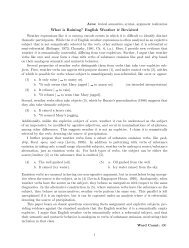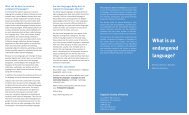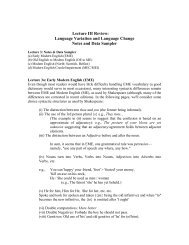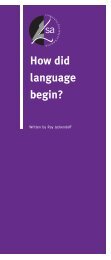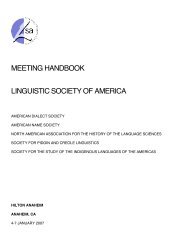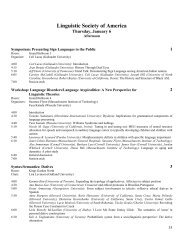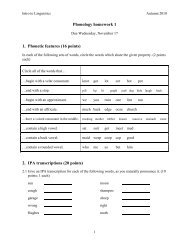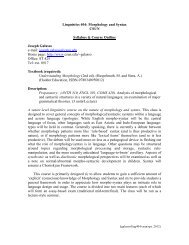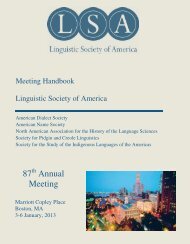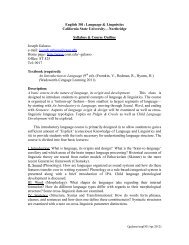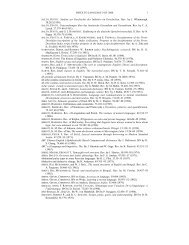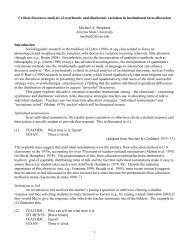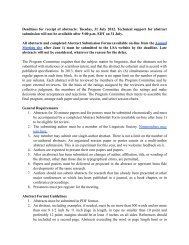here - Linguistic Society of America
here - Linguistic Society of America
here - Linguistic Society of America
Create successful ePaper yourself
Turn your PDF publications into a flip-book with our unique Google optimized e-Paper software.
Saturday, 5 JanuarySymposiumLinguists Gaining and Sharing AccessFairfield/Exeter/Dartmouth2:00 – 5:00 PMOrganizer:Participants:Marilyn S. Manley (Rowan University)Elena Benedicto (Purdue University)Ellen H. Courtney (The University <strong>of</strong> Texas at El Paso)Susan E. Kalt (Roxbury Community College)Marilyn S. Manley (Rowan University)Antje Muntendam (Radboud University Nijmegen)Liliana Sánchez (Rutgers University)This organized session, “Linguists gaining and sharing access”, was inspired by the MLA 2013 Convention’s Presidential Theme,“Avenues <strong>of</strong> Access”. Of these six presentations, the first three address ways in which linguists may gain access to languagespeakers and language data and the last three examine how linguists may work to share various types <strong>of</strong> access with others.Both at the start and at the heart <strong>of</strong> any linguistic endeavor is access to language and language speakers. Sánchez details the stepsthat must be taken by linguists in order to ensure that native populations are approached ethically and respectfully. Drawing onher fieldwork in Peru, Sánchez discusses the importance <strong>of</strong> following necessary protocols, respecting the rights <strong>of</strong> indigenouspopulations, establishing strong personal connections with language speakers, and including beneficial aspects <strong>of</strong> the linguisticresearch for the language speakers.After gaining access to language speakers, the linguist must devise and carry out linguistically and culturally-appropriate researchmethodologies in order to gain access to the language data. Both Courtney and Muntendam address a variety <strong>of</strong> innovativemethodologies for gathering linguistic data in Quechua speech communities. Courtney addresses building trusting relationshipswith children and their parents, the challenges in<strong>here</strong>nt in the collection <strong>of</strong> naturalistic speech data from children, and theadaptation <strong>of</strong> experimental procedures to the cultural reality <strong>of</strong> Andean child participants. Based on her work with adult Quechuaspeakers in Bolivia, Ecuador and Peru, Muntendam provides suggestions for the collection <strong>of</strong> more reliable sociolinguisticbackground information and for ways in which to overcome a variety <strong>of</strong> problems that arise while engaged in naturalistic datacollection.Once linguists have gained access to language speakers and language data, they must fulfill their responsibility to make theirwork accessible to others. Both Kalt and Benedicto focus on ways in which linguists make their methods and findings accessibleto the speech communities w<strong>here</strong> the data originated. Kalt provides examples <strong>of</strong> collaborations between linguists and indigenousgroups in the documentation <strong>of</strong> their languages and cultures, and describes Proyecto Yachay Q’ipi, an ongoing project in Boliviaand Peru to engage rural educators along with graduates <strong>of</strong> an intercultural education master’s program in seeking communityinput in the creation <strong>of</strong> native language curriculum materials for use in rural elementary schools. Benedicto draws from her workin Nicaragua to focus on how linguists can provide access to a language community to linguistic research publications and theraw language data that they produced in a meaningful way.In addition to linguists’ providing access to the language speakers with whom they worked, linguists also have a responsibility toshare language access with those outside <strong>of</strong> the language community. Manley details her ongoing efforts to encourage a generalpublic awareness <strong>of</strong> Quechua language and culture and support the maintenance <strong>of</strong> Quechua by teaching basic Cuzco Quechualanguage within the context <strong>of</strong> two, interdisciplinary, university-level courses, organizing campus visits by an Ecuadorianindigenous music ensemble, and creating online Quechua language learning resources included within the Museum <strong>of</strong>Anthropology at Rowan University (MARU).Abstracts:Liliana Sánchez (Rutgers University)The linguist gaining access to the indigenous populationsMany linguistics students and researchers develop an interest in conducting research and data collection in native or indigenouslanguages spoken in countries and regions different from their own and by indigenous communities (Bowern 2010). Beforestarting a project, t<strong>here</strong> are some necessary steps that must be taken to ensure ethical guidelines are followed (Rice 2006). In this106



